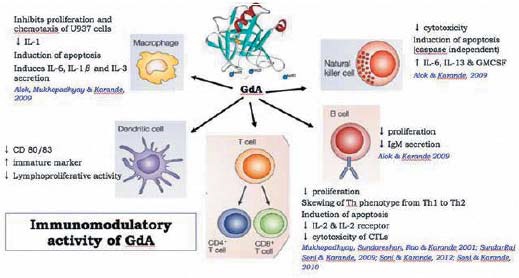
Centre for Human Genetics
Bangalore.

Bangalore.

Anjali Anoop Karande
PhD, Cancer Research Institute, Mumbai
My research group has focussed on two main areas of research. (i) Immunomodulation at the foeto-maternal interface: Role of glycodelin-A in maintaining foetal tolerance The foetus expresses paternal allo-antigens and is regarded as non-self by the maternal immune system but for a handful of indispensable factors that protect it from rejection to sustain pregnancy. One such molecule is glycodelin-A (GdA), secreted by the endometrium under progesterone regulation. Data from our laboratory have revealed that GdA inhibits proliferation of all the immune cells and induces apoptosis in activated T cells, NK cells and monocytes via the CD7 receptor, thereby making the uterine compartment an immunologically privileged site.We explored the immunosuppressive property of glycodelin for its possible use in preventing graft rejection. Because glycodelin is a primate-specific protein, the hypothesis was investigated in an allograft nude mouse model. Cytotoxic cells generated from human peripheral blood lymphocytes effectively decreased growth of the target transplanted human cells in the immunologically compromised nude mice. Importantly, addition of physiological concentrations of GdA to the system rescued the target cells from being killed. These observations lead to the interesting possibility of utilising glycodelin in the management of graft vs. host reaction. (ii) Immunotoxins: Construction of vaccines to neutralize abrin-mediated toxicity Immunotoxins, constructed by conjugating a cellsurface- receptor-specific antibody to a lethal toxin, are being considered for treatment of cancer in combination therapy. The plant toxin abrin is a type II ribosome inactivating protein (RIP) and has a very high catalytic efficiency. Apart from inhibiting protein synthesis, abrin also induces apoptosis, which makes it a good candidate for cancer therapy. We conjugated the recombinant toxin A chain of abrin to an antibody raised against human gonadotropin releasing hormone receptor (GnRHR), the gene for which is overexpressed in a few cancers. The immunoconjugate inhibited protein synthesis and also induced apoptosis specifically in cells expressing GnRHR. Our studies have provided proof of concept for utilisation of abrin in cell-targeted killing. Abrin, a highly lethal toxin (LD50 1 μg per kg body weight), is listed under bioterrorists' weapons. Towards establishing abrin-neutralising reagents we have obtained highaffinity monoclonal antibodies that protect mice against lethal doses of the toxin. Efforts are on to expand the therapeutic window for effectiveness of the antibodies. Establishing virus entry inhibitors:In a collaborative project on hepatitis C virus (HCV) therapeutics, we have established several monoclonal antibodies that effectively inhibit virus entry in human hepatocytes. We also identified and characterised small-molecule inhibitors from plant sources that may be utilised to prevent HCV infection.

Selected publications:
1.Glycodelin-A interferes with IL-2/IL-2R signalling to induce cell growth arrest, loss of effector functions and apoptosis in Tlymphocytes.Human Reproduction, 27: 1005-1015 (2012). Soni C, Karande AA 2.Abrin immunotoxin: Targeted cytotoxicity and intracellular trafficking pathway. PLoS One, 8: article number e58304 (doi: 10.1371/ journal.pone.0058304) (2013). Gadadhar S, Karande AA 3.Mechanistic insights into the neutralization of cytotoxic abrin by the monoclonal antibody D6F10.PLoS One, 8: article number e70273 (doi: 10.1371/journal.pone.0070273) (2013). Bagaria S, Ponnalagu D, Bisht S, Karande AA 4.Identification of a flavonoid isolated from plum (Prunus domestica)as a potent inhibitor ofhepatitis C virus entry.Scientific Reports, 7: article number 3965 (doi:10.1038/s41598-017- 04358-5 (2017). Bose M, Kamra M, Mullick R, Bhattacharya S, Das S, Karande AA 5.Immunomodulatory activity of glycodelin: implications in allograft rejection. Clinical and Experimental Immunology, 192: 213-223 (2017).Dixit A, Balakrishnan B, Karande AA
Copyright © 2011 - All Rights Reserved - Taurus Hard Soft Solutions Pvt. Ltd
Stay Up to Date With Whats Happening